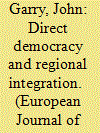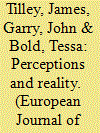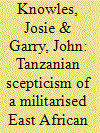| Srl | Item |
| 1 |
ID:
120133


|
|
|
|
|
| Publication |
2013.
|
| Summary/Abstract |
Analyses of voting in European Union referendums typically distinguish between 'second-order' effects and the impact of substantive 'issues'. In order to explain change in referendum outcome, two types of substantive issues are distinguished in this article. Focusing on Irish voting in the Lisbon Treaty referendums and using data from post-referendum surveys, it is found that perceptions of treaty implications outperform underlying attitudes to EU integration in predicting vote choice at both referendums, and perceptions of treaty implications are strong predictors of vote change between the referendums. The findings have broadly positive implications for normative assessments of the usefulness of direct democracy as a tool for legitimising regional integration advance.
|
|
|
|
|
|
|
|
|
|
|
|
|
|
|
|
| 2 |
ID:
083266


|
|
|
|
|
| Publication |
2008.
|
| Summary/Abstract |
Abstract. One of the most influential explanations of voting behaviour is based on economic factors: when the economy is doing well, voters reward the incumbent government and when the economy is doing badly, voters punish the incumbent. This reward-punishment model is thought to be particularly appropriate at second order contests such as European Parliament elections. Yet operationalising this economic voting model using citizens' perceptions of economic performance may suffer from endogeneity problems if citizens' perceptions are in fact a function of their party preferences rather than being a cause of their party preferences. Thus, this article models a 'strict' version of economic voting in which they purge citizens' economic perceptions of partisan effects and only use as a predictor of voting that portion of citizens' economic perceptions that is caused by the real world economy. Using data on voting at the 2004 European Parliament elections for 23 European Union electorates, the article finds some, but limited, evidence for economic voting that is dependent on both voter sophistication and clarity of responsibility for the economy within any country. First, only politically sophisticated voters' subjective economic assessments are in fact grounded in economic reality. Second, the portion of subjective economic assessments that is a function of the real world economy is a significant predictor of voting only in single party government contexts where there can be a clear attribution of responsibility. For coalition government contexts, the article finds essentially no impact of the real economy via economic perceptions on vote choice, at least at European Parliament elections.
|
|
|
|
|
|
|
|
|
|
|
|
|
|
|
|
| 3 |
ID:
146919


|
|
|
|
|
| Summary/Abstract |
Attitudes towards a regional military force are of paramount importance when exploring public support for regional integration. Until now, however, scholarly research has not considered the influence of attitudes towards a regional military mechanism in the sub-Saharan African context. Using Afrobarometer data, we demonstrate that military concerns are vital when exploring Tanzanian attitudes towards the proposed political federation of the East African Community (EAC), the East African Federation (EAF). More specifically, opposition to military cooperation strongly influences Tanzanian scepticism of the EAF. This finding is highly relevant given that referendums in the participating member states must be passed to facilitate political integration. Heightened opposition towards military cooperation raises the possibility of the public rejecting a politically integrated EAC. This poses a potential obstacle to the implementation of joint security policies and crucial mechanisms to provide a more stable region at large. We account for alternative explanations of Tanzanian opinion formation and reflect on the strength of military-orientated concerns for investigating public support for the East African project specifically and regional integration in sub-Saharan Africa more widely.
|
|
|
|
|
|
|
|
|
|
|
|
|
|
|
|